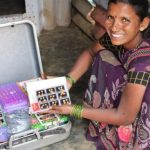WOMEN EMPOWERMENT
The world came crashing down around 24-year-old Rinku Devi when her husband passed away in a fatal accident, leaving behind three sons to care for. He was a daily wage labourer at a construction site in Kolkata, while she lived with her in-laws back in Khesrahi village in Vaishali district of Bihar. When her feeble father-in-law became the sole breadwinner in the family, Rinku was propelled to rise against conservative norms and step out of the house to earn an income.
It has been 13 years now since Rinku got recruited as an Accredited Social Health Activist (ASHA) in Ward no. 4 of Khesrahi village and singlehandedly supported her family. “Pahle sabke ghar jaake samjhaane mein dikkat lagta tha, par ab toh sab humko dhoondhti hai,” (Earlier I would struggle to explain healthcare concepts to people during home visits, but now they seek me out for advice), shares Rinku.
The lady supervisor of Rinku’s ward, Daisy Kumari, is all praise for her colleague. She proudly shares that Rinku has never missed a single ASHA meeting and is one of the most active workers in the area.
It was through these meetings that Rinku learnt about the ongoing family planning campaign, that emphasises the importance of birth spacing and the basket of choices. She understood the usage of each method and its respective side effects, which further helped her in advising different methods to each beneficiary. With the help of this training, she could advise her 20-year-old daughter-in-law, Julie to take Chhaya tablets (nonhormonal tablets) after six weeks of her delivery. When enquired why Rinku suggested this, she confidently replies because it was the safest pill, to be taken only twice a week. Rinku has been visiting women in her ward regularly and discussing birth spacing methods.
Rinku’s work requires her to discuss sensitive issues within households, which has been a massive challenge. Nevertheless, her constant persistence and persuasion has led to an increase in the number of women adopting family planning methods in the village. Rinku shares the current ordeal of a 23-year-old Sapna who is already a mother of two daughters and one son. Sapna wishes to opt for a tube ligation as she does not want more children, but her mother-in-law has forbidden it because she wants more grandsons. Helpless, Sapna approached Rinku for help.
Rinku tried to persuade the mother-in-law in favour of the ligation but it was in vain. The mother-in-law continued to disagree with the method. In order to remedy the situation and keep both parties happy, she suggested that Sapna take Chhaya tablets for birth spacing, since her youngest child is only six months old. The mother-in-law agreed with this method, when she was convinced that Sapna could have children whenever she wanted, if she discontinued the tablets later on.
The age-old resistance of society towards contraceptive methods makes Rinku’s work tough but her sound knowledge and amiable communication skills aid her in winning most of her daily battles.
About the Programme: CARE India has been actively supporting the government’s Family Planning programmes under Mission Parivaar Vikaas. As part of this, ASHAs are trained about birth spacing and the basket of choices for family planning methods. They are also oriented to offer proper counselling to beneficiaries ahead of the planning campaigns. This is called Family Planning Pakhwada.
Posted by: Sneha Pandey
Location: Khesrahi village, Patepur block, Vaishali district in Bihar
In 2022, for International Women’s Day (IWD), the UN has adopted the theme ‘Gender equality today for a sustainable tomorrow’, to celebrate the tremendous efforts by women and girls around the world in shaping a more equal future and recovery from the COVID-19 pandemic.






